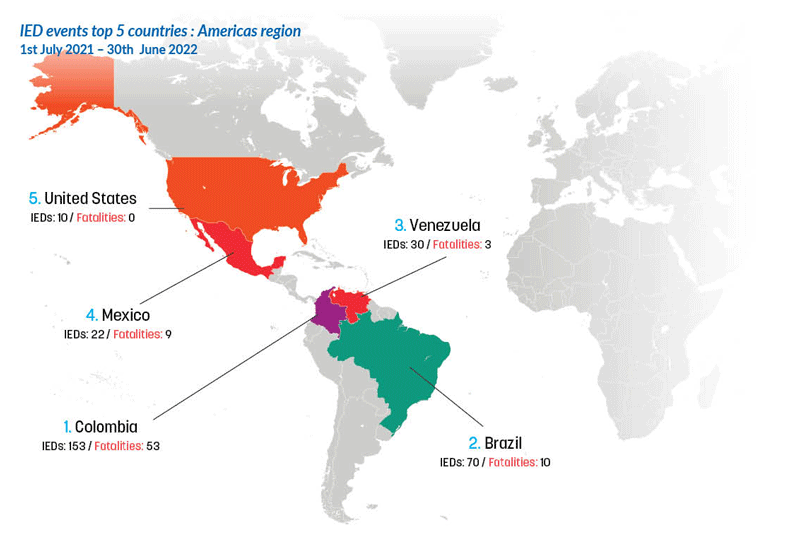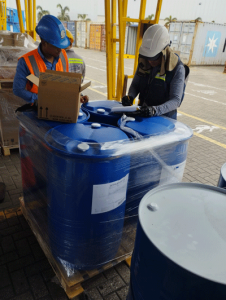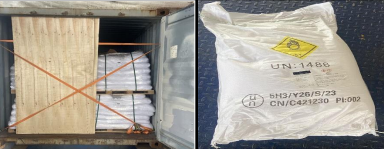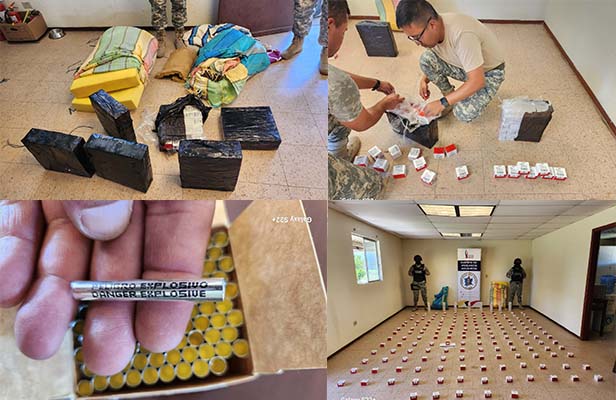Operation Arena Blanca: Customs administrations of the Americas and Caribbean region mobilize to counter IED production
17 October 2023
By the Programme Global Shield team, WCO SecretariatThe threat of an improvised explosive device (IED) attack is a global problem. Although not a recent phenomenon, the use of IEDs in modern warfare and by terrorist groups has grown exponentially in the 21st century. Part of the reason that IEDs are so prevalent is that they are cheap and relatively easy to manufacture. They can be made from a range of materials, including commercially available chemicals such as ammonium nitrate and potassium chlorate – two chemicals used in the production of fertilizers. Most of the attacks carried out with IEDs have a cross-border component, meaning that some of the materials used to manufacture the IEDs were sourced outside of the country in which the attack occurred.
To help Customs identify and stem the diversion of these chemicals, the WCO established Programme Global Shield. One of the activities carried out under the Programme is to organize regional and global enforcement operations. Such operations take stock of a Customs administration’s capacity to carry out efficient controls and to work with its counterparts to that end. These operations also enable administrations to learn from each other’s strategy and to share information such as modi operandi. This article introduces the Programme as well as the results of the enforcement operation conducted a few months ago with countries of the Americas and Caribbean region to establish tighter controls over materials and components used for making IEDs.
Programme Global Shield (PGS)
Launched in 2010, PGS is an initiative aimed at building Customs capacity to monitor the licit movement and counter the illicit trafficking and diversion of explosive precursor chemicals and other components of IEDs.
The team in charge of the Programme at the WCO Secretariat supports Customs administrations by undertaking an assessment of their enforcement capacities, promotes cooperation among Customs and Police, engages with private industry, trains Customs officers in detecting and handling precursor chemicals, shares information on the composition and production methods of captured IEDs, facilitates investigations, and organizes enforcement operations. It does so in partnership with INTERPOL and the United States Defense Threat Reduction Agency (DTRA), as well as with many experts from Customs and other enforcement agencies.
PGS is also aimed at increasing information exchange between Customs administrations and the WCO Secretariat to enable comprehensive analysis of licit and illicit trade. To achieve this objective, Customs administrations have been called upon to appoint PGS National Contact Points (NCPs).
Finally, Customs administrations are encouraged to reach out to private stakeholders in the chemical industry in order to increase awareness of the dual-use capability of the precursor chemicals they manufacture, distribute or retail.
Threats posed by IEDs in the Americas and Caribbean region
Between February 2022 and January 2023, 138 IED attacks resulting in 47 fatalities were reported within the region. They were perpetrated by various groups.

In Colombia, on 2 September 2022, seven Police officers were killed in an attack by members of the Dagoberto Ramos Mobile Column, a dissident group of the demobilized Revolutionary Armed Forces of Colombia (FARC). The perpetrators ambushed the Police unit by opening fire on them after detonating an explosive device.
In Venezuela, on 6 November 2022, members of the Scientific, Criminal and Criminalistic Investigation Service Corps (CICPC) of the national Police clashed with members of the El Zorrito gang in the city of Barcelona. Three suspects were killed in the shootout, including the gang’s leader. One had threatened to use an explosive device against the officers before he was shot.
In Mexico, on 4 January 2023, there was a clash between armed individuals and military forces in the town of Guaymas. Four military officers were injured. The armed individuals threw an explosive device at the officers.
Operation Arena Blanca
 To support the countries of the region in reducing the illegal diversion of chemical precursors and additional IED components, the WCO Secretariat organized two workshops in October and November 2022, conducted an IED threat analysis, and coordinated a two-week enforcement operation called Operation Arena Blanca.
To support the countries of the region in reducing the illegal diversion of chemical precursors and additional IED components, the WCO Secretariat organized two workshops in October and November 2022, conducted an IED threat analysis, and coordinated a two-week enforcement operation called Operation Arena Blanca.
Thirteen precursor chemicals, identified by industry experts as posing the greatest threat in terms of their use in IEDs, were the focus of these various activities, along with detonators and transmitting devices, one type of metal (aluminum), and commercial drones (Harmonized System (HS) subheading 8525.80). Aluminum paste, powder or flakes can enhance the explosion capability of IEDs, while commercially available drones can be used either for the delivery of IEDs or as IEDs in themselves, set to detonate when picked up or examined.
| Targeted precursor chemicals |
Chemical Abstracts Service (CAS) number | Harmonized System (HS) Code |
| Ammonium Nitrate | 6484-52-2 | 3102.30 |
| Nitromethane | 75-52-5 | 2904.20 |
| Sodium Nitrate | 7631-99-4 | 3102.50 |
| Potassium Nitrate | 7757-79-1 | 2834.21 |
| Sodium Chlorate | 7775-09-9 | 2829.11 |
| Potassium Chlorate | 3811-04-9 | 2829.19 |
| Potassium Perchlorate | 7778-74-7 | 2829.90 |
| Acetone | 67-64-1, 7217-25-6 | 2914.11 |
| Hydrogen Peroxide | 7722-84-1 | 2847.00 |
| Ammonium Calcium Nitrate double salt | 15245-12-2 | 3102.60 |
| Calcium Ammonium Nitrate | 15245-12-2 | 3102.90 |
| Nitric Acid | 7697-37-2/43625-06-5/13587-52-5 | 2808.00 |
| Urea | 57-13-6 | 3102.10 |
In cooperation with the United States DTRA and the Regional Intelligence Liaison Office for Central America, the WCO Secretariat’s PGS team conducted a regional and national threat assessment, analysing trading patterns, transport systems, commercial and industrial activities, levels of development, areas of instability, and the presence of violent organizations in some countries.
In line with the Guidelines on the implementation of WCO operations at national level, participating administrations were also requested to conduct trade and threat analyses, draft national implementation plans and risk profiles, identify other government agencies to join the Operation (e.g. Police, licensing or permit-issuing authorities), conduct training, set up joint control units at selected border points wherever possible, and set up an NCP hub consisting of representatives of all partner agencies.
During the operational phase of the actual Operation, participating Customs administrations and partner agencies were asked to strengthen controls on all cross-border operations (importation, transit, exportation) involving the targeted goods and to enhance targeting capacities to identify smuggling attempts. They were also to conduct end-user audits to ensure legal usage of the materials, and report any suspicious movements or usage to enable follow up investigations. Information related to such controls, whether or not they resulted in a seizure, was to be reported via the WCO’s secure operational communication platform, known as CENcomm.
The Guidelines list the basic steps that Customs administrations should take when considering whether to participate in an enforcement operation, when preparing for it, when implementing the various activities requested of all participants, and when evaluating the results and follow-up actions. Among other things, they include a detailed outline of the national operational plan.
Results
Some 24 administrations of the Americas and Caribbean region participated in the Operation and 1,788 licit shipments were reported during the operational phases. Among all PGS monitored goods, urea was the most prominent traded commodity in the region for both importation and exportation, followed by ammonium nitrate and hydrogen peroxide. Mexico imported the most targeted precursor chemicals and IED components, followed by Guatemala and Costa Rica. Brazil exported the highest amount of targeted precursor chemicals and IED components, followed by Honduras.
The following commodities were seized:
- 830 kg of chemical precursors, including 800 kg of undeclared potassiumnitrate seized at Balboa seaport by Panama Customs. The shipment was hidden in a container of ammonium nitrate. The Customs check was based on risk profiling.

- 20,000 detonators discovered by Ecuador Customs in the luggage of a Peruvian passenger on an Ecuadorian coach during a routine control. Investigations are ongoing, but it is worth noting that detonators are regularly smuggled into Ecuador for illegal mining.

Some administrations also reported seizures of other illicit commodities including:
- 14,969 kg of methamphetamine mixed with tequila, found in a consignment which was due to be exported from Mexico to the Netherlands.
- 11,892 MDMA-ecstasy tablets, discovered in the luggage of a passenger who had arrived in Paraguay from Panama.
- 236 air guns concealed in furniture in a container imported into Guatemala from the United States.
- 300 rounds of ammunition at a Mexican land border crossing, discovered in a lorry travelling from the United States.
- 1,060,000 cigarillos at a port in Panama, discovered in a container shipped from Vietnam.
- 6,695,000 pieces of goods suspected of infringing intellectual property rights, found in a consignment imported into Ecuador from Panama.
- 5,650 kg of undeclared bottles of mineral water in a consignment imported into Costa Rica from France.
Gaps identified and recommendations for Customs
This was the first time that the PGS team had worked with Customs of the Americas and Caribbean region on IED precursors and other components. It offered a unique opportunity for the Secretariat to identify capacity building needs and enhancement opportunities, some of which are listed below.
Licensing schemes covering all targeted precursor chemicals need to be established
Countering the diversion of precursor chemicals and other IED components requires the establishment of comprehensive licensing procedures, including end-user certificates which certify that the buyer is the end-user of the products, as well as post-clearance audits for licensed companies. Only a few countries in the Americas and Caribbean region have established such schemes for all precursor chemicals covered during the Operation; however, these schemes will enable them to improve their risk assessment and profiling capacities.
More data is needed on the licit movement of the goods concerned
Customs administrations were asked to submit data on the goods concerned ahead of the Operation, but some faced issues in obtaining the requested information. This data is critical to gain a better understanding of the movement and end use of the targeted products, so as to enhance the efficiency of controls. PGS NCPs should consider working closely with their national statistics or IT services to ensure submission of the data on a monthly basis.
There is a need to conduct thorough risk assessments
Conducting risk assessments and profiling to avoid the diversion of legal products requires a great deal of effort. This process includes undertaking comprehensive licence checks and post-clearance audits, as well as sharing intelligence with other relevant agencies.
Engaging with the chemical industry and with end-users
Customs administrations are encouraged to reach out to private stakeholders in the chemical industry in order to increase awareness of the dual-use capability of the precursor chemicals the latter manufacture, distribute or retail. They should also collaborate with legitimate end-users, such as the mining industry, and ensure that they secures their stocks in order to prevent their products from falling into the wrong hands.
Strengthening Customs-Police cooperation
Only a few administrations confirmed that they had engaged with their national Police, and no information or intelligence was submitted by Police services during the Operation. Thought should be given to participation by Police representatives in future WCO workshops.
There is a need to boost reporting capacity
Although training on the use of the CENcomm was provided and templates developed to reduce data entry workload, some administrations faced problems in sharing information via the platform. As reporting is set to continue using the CENcomm PGS platform, countries must ensure that their reporting procedures are effective.
Way ahead
Subject to the availability of funds, a number of activities could be conducted by the PGS team to support countries in the Americas and Caribbean region. Customs training capacities could be strengthened by accrediting experts and trainers from the region. The team could also provide assistance with amending the regulations in place and with implementing comprehensive licensing procedures, such as those followed by the United States and the European Union. Finally, the team could help with the development of industry outreach programmes.
More information
enforcement@wcoomd.org

